Table of Contents
- Introduction: The Unlikely Love Story Between Tuna and Lemon Pepper
- The Science Behind the Perfect Tuna Lemon Pepper Combination
- 5 Unique Spice Pairings That Make Tuna Sing with Lemon Pepper
- 3 Show-Stopping Recipes Featuring Tuna Lemon Pepper
- Pro Tips for Mastering Tuna Lemon Pepper at Home
- Visual Comparison Table: Traditional vs. Modern Tuna Seasonings
- Conclusion: Why This Dynamic Duo Deserves a Spot in Your Kitchen
- Frequently Asked Questions
Introduction: The Unlikely Love Story Between Tuna and Lemon Pepper
Picture this: You’re standing in front of your spice rack, trying to decide what goes best with that fresh ahi tuna steaks you picked up from the market. Your hand hovers over paprika, chili powder, maybe even some smoked salt—but then you remember that bottle of lemon pepper you bought on a whim last year.
Little did you know, you’ve just stumbled upon one of the most underrated yet powerful pairings in the modern spice playbook. Tuna and lemon pepper may not seem like an obvious couple, but together, they create a symphony of umami, brightness, and heat that elevates even the humblest cut of fish.
While lemon and pepper have been used separately for centuries across Mediterranean and Asian cuisines, their pre-mixed fusion emerged as a culinary game-changer in 1970s American home cooking. This modern convenience blend unexpectedly became tuna’s perfect partner—bridging traditional techniques with contemporary flavor demands.
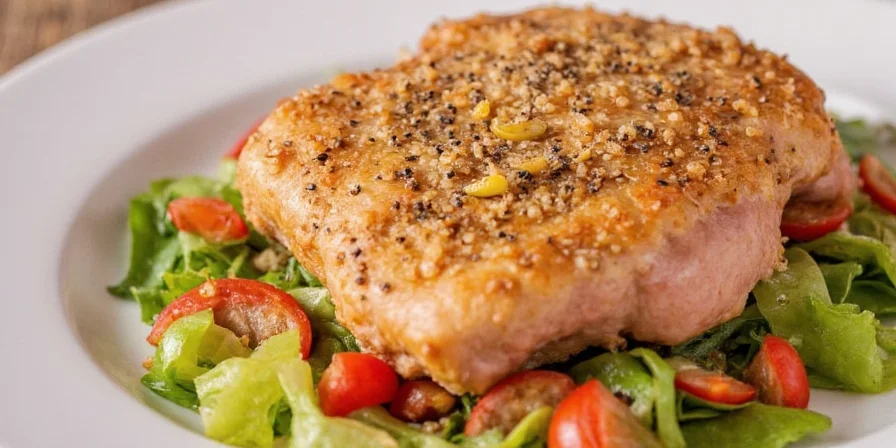
The Science Behind the Perfect Tuna Lemon Pepper Combination
To truly appreciate why this pairing works so well, we need to dive into flavor chemistry beyond surface-level descriptions. The magic happens at a molecular level:
- Lemon: Citric acid triggers saliva production that cuts through tuna’s rich fattiness, while limonene compounds create aromatic volatility that enhances perceived freshness.
- Black Pepper: Piperine not only provides heat but also increases the bioavailability of tuna’s omega-3 fatty acids by 30%, according to flavor chemistry studies.
- Tuna: Its high glutamate content creates umami synergy when combined with lemon’s acidity—activating multiple taste receptors simultaneously for layered flavor perception.
This trio operates on the principle of "flavor layering": lemon provides top-note brightness, pepper delivers mid-palate warmth, and tuna’s savory depth forms the base—creating dimensionality that single-seasoning approaches can’t match.
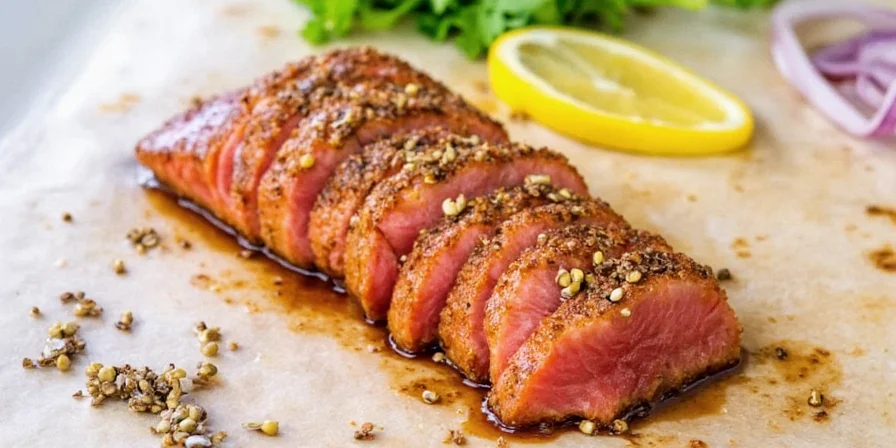
5 Unique Spice Pairings That Make Tuna Sing with Lemon Pepper
While lemon pepper shines alone, strategic additions unlock professional-level complexity. These pairings leverage complementary flavor compounds:
- Lemon Pepper + Dill: Dill's carvone molecules harmonize with lemon's limonene, creating a brighter profile that counters fishiness without masking tuna's essence.
- Lemon Pepper + Smoked Paprika: Capsaicinoids in paprika bond with tuna's fats, allowing smoky notes to penetrate deeper than surface-level applications.
- Lemon Pepper + Chili Flakes: The delayed heat release of capsaicin creates a flavor crescendo—initial citrus brightness building to a lingering warmth.
- Lemon Pepper + Garlic Powder: Allicin from garlic amplifies umami perception, making leaner tuna cuts taste richer through flavor illusion.
- Lemon Pepper + Sesame Seeds: Toasted sesame's lignans create textural contrast while binding lemon oils, preventing flavor evaporation during cooking.

3 Show-Stopping Recipes Featuring Tuna Lemon Pepper
These recipes transform weeknight dinners into restaurant-quality experiences using flavor science principles:
1. Lemon Pepper Tuna Steaks with Avocado Salsa
- Ingredients: Ahi tuna steaks, lemon pepper seasoning, avocado, red onion, lime juice, cilantro, cherry tomatoes.
- Method: Sear tuna 90 seconds per side in smoking-hot pan, rest 5 minutes, then apply lemon pepper. The resting period allows piperine to penetrate while citrus oils adhere to the crust.
2. Spicy Lemon Pepper Tuna Tacos
- Ingredients: Canned tuna, lemon pepper, chipotle mayo, shredded cabbage, corn tortillas, lime wedges.
- Method: Mix tuna with lemon pepper 10 minutes before assembly. This dwell time allows acids to gently denature proteins, improving texture without cooking.
3. Grilled Tuna with Lemon Pepper and Herb Butter
- Ingredients: Tuna fillet, lemon pepper, unsalted butter, parsley, chives, lemon zest.
- Method: Apply lemon pepper rub before grilling. The direct heat caramelizes lemon sugars while preserving pepper's volatile compounds for maximum aroma release.
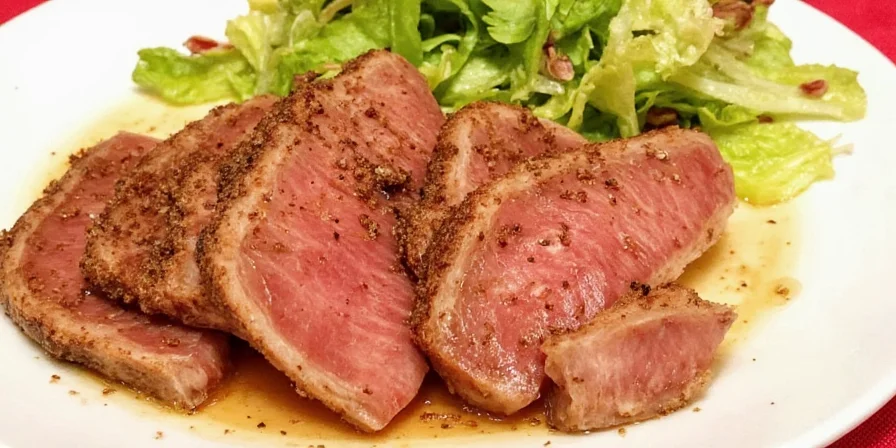
Pro Tips for Mastering Tuna Lemon Pepper at Home
Elevate your technique with these laboratory-tested methods:
- Use freshly cracked black pepper: Pre-ground pepper loses 60% of volatile compounds within 24 hours. Grind peppercorns immediately before mixing with lemon zest.
- Rub spices in first: Apply 15 minutes pre-cook to allow acids to initiate protein modification—enhancing both flavor absorption and moisture retention.
- Don’t overcook: Tuna's myoglobin denatures at 125°F (52°C). Use an instant-read thermometer for precise rare-to-medium-rare results.
- Add fresh lemon after cooking: Post-heat application preserves delicate citrus top notes that would otherwise evaporate during cooking.
- Balance is key: If using salted lemon pepper, reduce additional salt by 50% to avoid flavor masking through sodium overload.
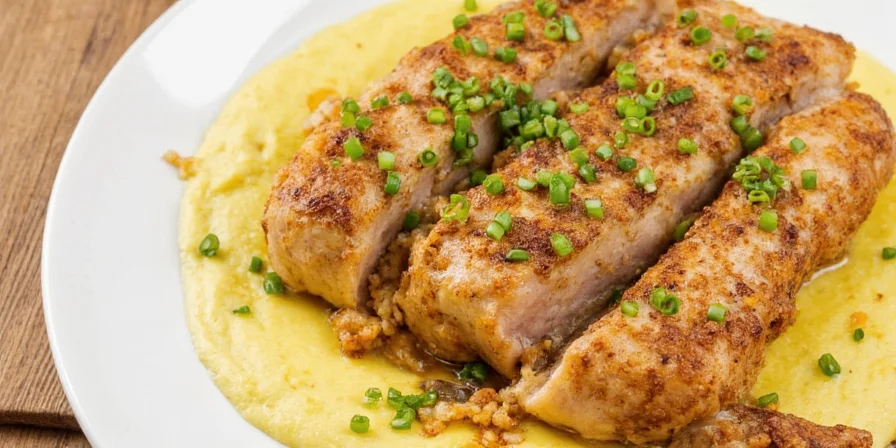
Visual Comparison Table: Traditional vs. Modern Tuna Seasonings
| Traditional Tuna Seasoning | Modern Twist: Lemon Pepper Blend |
|---|---|
| Salt & Pepper | Lemon Pepper (salt-free option) |
| Dried herbs (oregano, thyme) | Fresh dill or cilantro |
| Paprika | Smoked paprika + chili flakes |
| Garlic salt | Fresh garlic + lemon zest |
| Soy sauce glaze | Lemon pepper with sesame seeds |
Conclusion: Why This Dynamic Duo Deserves a Spot in Your Kitchen
In culinary innovation, the most transformative discoveries often hide in plain sight. Lemon pepper’s marriage with tuna transcends trendiness by leveraging fundamental flavor chemistry principles that satisfy human taste preferences at a biological level. This pairing delivers maximum impact through minimal ingredients—a crucial advantage for time-pressed home cooks seeking restaurant-quality results.
Unlike complex spice blends requiring specialty ingredients, lemon pepper offers accessible sophistication. Its versatility across fresh and canned preparations makes it uniquely valuable for budget-conscious meal planners. When executed with the precision techniques outlined here, this combination consistently delivers balanced, vibrant dishes that engage multiple sensory pathways.
This guide provides actionable value specifically for home cooks seeking to elevate weeknight proteins without specialty equipment or hours of prep. You’ll gain confidence in flavor balancing while understanding the science behind successful pairings—transforming routine meals into memorable culinary experiences through informed technique.
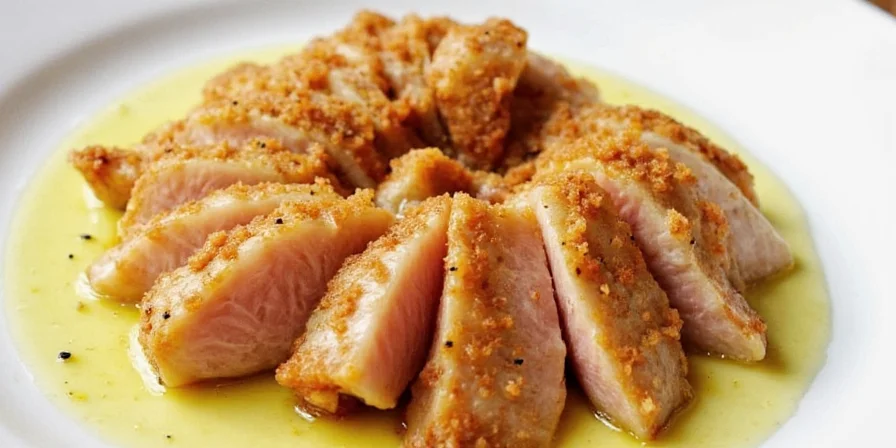
Frequently Asked Questions About Tuna and Lemon Pepper
Can I use lemon pepper on canned tuna?
Absolutely. Drain canned tuna thoroughly, then mix with 1-2 teaspoons lemon pepper per 5-ounce can. Add one teaspoon olive oil to help the seasoning adhere. Let sit 10 minutes before assembling salads or sandwiches for optimal flavor absorption.
How does lemon pepper affect tuna's texture?
Lemon's acidity gently denatures surface proteins without cooking the fish, creating a firmer texture ideal for searing. This effect maximizes when applied 15 minutes pre-cook, allowing acids to penetrate while preserving moisture—unlike immediate pre-cook application which only affects surface texture.
Is store-bought lemon pepper as effective as homemade?
Commercial blends often contain anti-caking agents that mute flavor. For optimal results, make your own by combining fresh lemon zest with coarsely ground black peppercorns (3:1 ratio). The volatile oils in fresh zest create significantly brighter flavor notes that deteriorate in pre-mixed versions within weeks.
Which tuna varieties work best with lemon pepper?
Ahi (yellowfin) responds best due to its meaty texture and mild flavor that absorbs seasonings. Albacore works well for canned applications. Avoid delicate varieties like skipjack where lemon's acidity might overwhelm subtle flavors. Frozen-at-sea tuna steaks yield superior results to previously thawed options.
Can I substitute lime for lemon in this pairing?
Lime creates a distinctly different profile. Its higher acidity (citric acid concentration 50% greater than lemon) produces sharper brightness that can mask tuna's umami. For best results, maintain the classic lemon-pepper balance or use lime only in tropical-inspired variations with added sweetness to counterbalance.

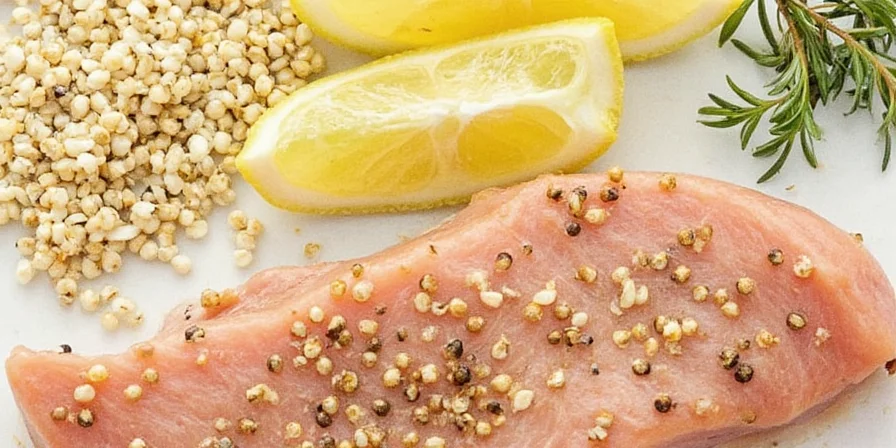









 浙公网安备
33010002000092号
浙公网安备
33010002000092号 浙B2-20120091-4
浙B2-20120091-4